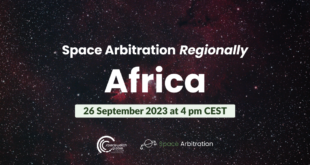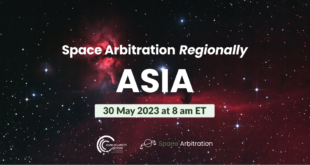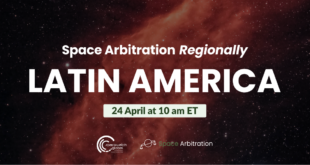By Luisa Low

During this week’s Space Café, SpaceWatch.Global Publisher Torsten Kriening caught up with Berlin-based litigation expert and ‘space geek’ Dr Jan Frohloff.
Having completed undergraduate and postgraduate degrees at the Johannes Gutenberg University Mainz and Kings College in London, Jan’s career began in 2008 as an intern at Jones Day’s Frankfurt office, he quickly rocketed his way up through the colossal law multinational, Baker & McKenzie as a dispute resolution associate, before moving to Morrison & Foerster in Berlin in 2020.
Now, fourteen years later, Jan is an author and independent practitioner working in the frontier land of space disputes, advising his clients on resolution and corporate matters. This week, he and fellow Berliner Torsten discuss this emerging area.
What are space disputes?
If it exists, humans will argue and potentially (but hopefully never) war over it – even more so if they have to share it.
With seemingly endless celestial territory ripe for the colonising, trillions in pounds, dollars, euro and Yuan to be made, and methods like treaties, traffic lights and right of way systems conceived in a bid to get everyone to play nice, it’s no surprise that humanity’s frenzied investment in space is leading to some disagreements.
So how does this discord manifest and how do you define it? According to Jan, there are two kinds of space disputes:
- Space industry disputes, which mainly centre on contractual and commercial disagreements, similar to every other industry. Occasionally they end up in arbitration, and;
- Space disputes (proper). They relate to space law and cover areas such as satellite collisions and shared resources in space and on celestial bodies.
So far, space industry disputes are a dime a dozen whereas space disputes are still rare, which means legal work in this area is largely focused on the creation of frameworks and agreements aimed at preventing future conflict.
“To my knowledge, there hasn’t been a dispute yet over space resources. That could change if you think about the fact that several companies have expressed their intent to mine for water ice on the Moon or Mars, and „to use it for propellant production, for liquid hydrogen or methane engines.”
“And then the question really arises: ‘okay, who has ownership over that propellant or over the water ice that was mined on other celestial bodies?’”
While the unpalatable threat of territorial space disputes is (thankfully) far off, satellites have caused diplomatic tensions in the past.
One such example is the bungled re-entry of the Soviet satellite Kosmos 954 in 1978. The reconnaissance satellite – which was launched into orbit to monitor ocean traffic – was powered by a nuclear reactor. During reentry it disintegrated, leaving a radioactive trail in its wake.
“It left a trail of radioactive debris over Canada. And that obviously led to very substantial cleanup operations by the Canadian government, and I think cost about 6 million Canadian dollars [approximately $23 million today].”
While such events have been few and far between, disputes triggered by satellites could pose a more immediate threat due to their ever growing numbers in orbit.
“Do I see more satellite collisions on the horizon? Yes. Unfortunately, yes.”
Who is responsible?
With so many state, private and multinational players in the game, who is responsible when such an event occurs? As Torsten points out, few cases are publicly visible and, like with many Earth-based conflicts, attempts to create and implement culpability in the event of crisis leads only to countless legal dead ends.
While some international legislation exists for space objects, legislation around celestial bodies and space territory is lacking.
Currently, if a space object causes damage to other infrastructure, a company or a country, they can make a claim to the United Nations, but there are several issues with this process, according to Jan.
“Number one is if you are a private satellite operator, private company, you yourself do not have a claim against the launching state – it’s a state to state liability. So, you cannot, as a private operator, cannot initiate the Claims Commission, you have to ask your home state to present that claim to the launching state.”
“And then the second problem is that the decision of the Claims Commission is only binding on the state parties if the parties have so agreed.”
So where does this leave legal minds like Jan who are working to secure the future of space? Most likely with lot of work cut out for them if the current status quo maintains that a responsibility shared is a responsibility foregone.
To listen to Jan Frohloff’s insights into the space disputes, you can watch the full program here:
Luisa Low is a freelance journalist and media adviser from Sydney, Australia. She currently manages Media and Public Relations for the University of Sydney’s Faculty of Engineering.





